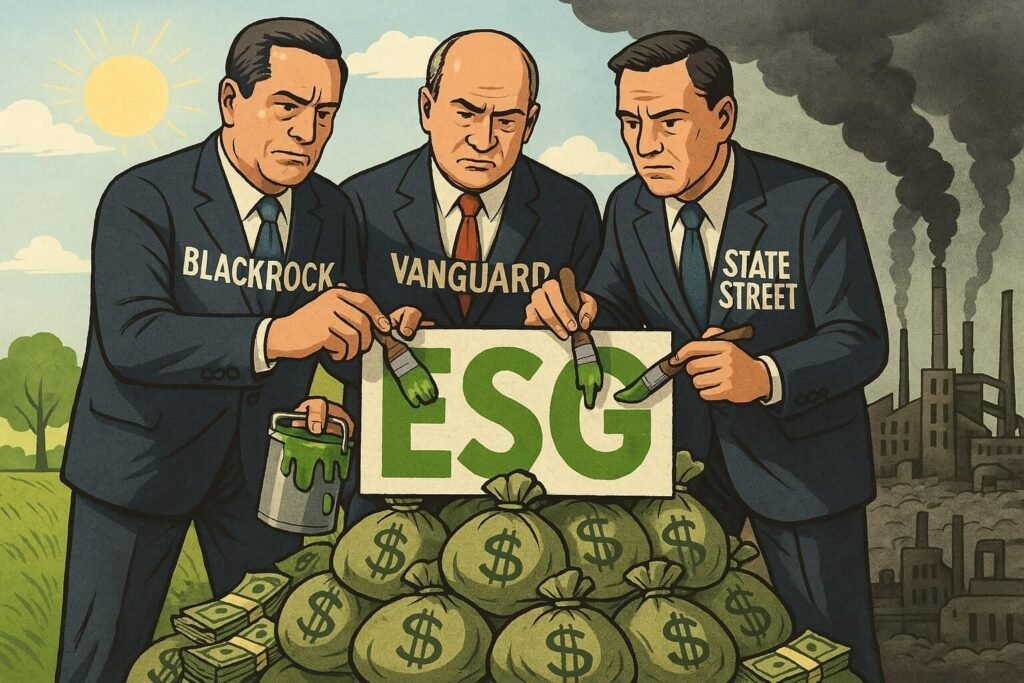Why the Big Three Push ESG – Explained
ESG sounds like moral progress. Save the planet. Promote fairness. Clean up capitalism.
But when the Big Three asset managers — BlackRock, Vanguard, and State Street — jumped on the ESG train, it wasn’t about saving the world. It was about saving their business model.
The result? ESG became less an ethical revolution, more a financial product in disguise.
Table of contents
What Is ESG Really?
ESG stands for Environmental, Social, and Governance standards.
On paper:
- Environmental → green policies, climate goals.
- Social → diversity, inclusion, fairness.
- Governance → corporate accountability.
In reality, ESG is vague. Who decides what’s “green enough”? Who measures “inclusion”? Scores differ wildly depending on who’s selling them. ESG is branding, not science.
Follow the Money
The Big Three dominate investing through passive index funds — cheap, automated products that simply mirror the stock market.
Problem: passive funds make less money per customer.
Solution: slap on an ESG label and charge more.
Think of it like supermarket carrots. Same product, new sticker: “organic.” Higher price.
By rebranding funds as “sustainable,” the Big Three turned a low-fee model into a higher-margin business. ESG was never just ethics — it was economics.
The Influence Game
Here’s the kicker: the Big Three own chunks of almost every major Western company. That gives them voting power at board meetings — without ever buying or selling stock directly.
But because they’re “passive,” they can’t dump companies they dislike. So they push influence instead:
- Forcing boards to adopt climate pledges.
- Nudging quotas for women or minorities.
- Branding themselves as moral referees of capitalism.
It looks progressive. In practice, it’s leverage. ESG became their tool to shape corporate behaviour while entrenching their own power.
Example: At ExxonMobil, BlackRock backed a hedge fund that forced through climate-focused directors. Not because oil giants suddenly discovered virtue — but because the Big Three discovered leverage. ESG is less about emissions, more about control.
Cynical? Maybe. But Effective.
The irony is rich.
The same firms that built fortunes on hands-off investing now sell themselves as guardians of the planet. ESG let them:
- Repackage old products.
- Charge higher fees.
- Stay politically untouchable.
- Play kingmaker in boardrooms.
It’s not morality. It’s strategy.
The ESG Backlash
Of course, the branding had a shelf life.
- Some US states now ban ESG in pension funds, calling it politics in disguise.
- Investors have grown sceptical of vague “sustainable” promises.
- Even the Big Three are backpedalling, quietly swapping “ESG” for softer phrases like risk management or long-term value.
The party went on too long. Now, they’re sneaking out the back door — richer, more powerful, but less trusted.
Why It Matters
The Big Three didn’t suddenly grow a conscience. They grew a business model. ESG was their way of defending turf, flexing muscle, and looking virtuous while staying profitable.
For citizens, the lesson is simple: when the richest institutions in the world sell morality, assume it’s a marketing strategy.
Because in finance, as in politics, the golden rule holds: values follow value.
Related Articles
- Stakeholder Capitalism – The Corporate Takeover of Democracy
- ESG – The Business of Virtue
- Corporate Executive Power: Who Runs the Show?
- For the bigger picture of how corporations gained their power, visit The Power of Business & Corporations Explainer Hub.
👉 Want the full story on how virtue became a business model? Visit our ESG Explainer Hub to see how finance, branding, and compliance turned morality into a market.
FAQ
Who are the “Big Three”?
BlackRock, Vanguard, and State Street — the largest asset managers controlling trillions through passive funds.
What is ESG in plain English?
A vague checklist of “ethical” policies — green, fair, and transparent — used as a marketing and compliance tool.
Why did the Big Three push ESG?
To rebrand passive funds, charge higher fees, and expand their influence over corporate boards.
Why is ESG controversial?
Because it mixes politics with finance, imposes vague moral rules, and often amounts to corporate PR rather than real change.
Is ESG dead?
Not dead — just rebranded. The Big Three still push the same policies, but now under softer labels like “long-term value.”



